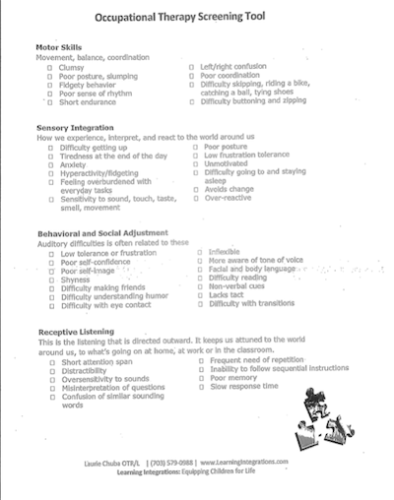Finding an occupational therapist for your child at home

by Kathy Kuhl How do you find a good occupational therapist (OT) for your child? Here’s advice from pediatric occupational therapist (and veteran homeschooler) Laurie Chuba. Part 1 of our conversation, Occupational therapy at home during COVID-19, is here.)
Most OTs work for either a school district, a clinic, or in private practice. If your child was receiving occupational therapy in public school, the school OT may be providing therapy remotely.
If you homeschool, your school district may not provide you occupational therapy. Policy varies by district.
Even if it does, you may not want therapy through the school.
Not want free therapy?!? Why not?
- As Ms. Chuba cautions, school OTs focus on building the skills needed to produce schoolwork. They also help provide suitable accommodations and changes to the environment. Their goal is to get students to be able to do the work in class.
But an OT in private or clinical practice can address a broader range of your student’s difficulties. - Some homeschool families who received therapy and services from public schools have been pressured to return their children to public school.
So then, should you take your child to a clinic or a private practice? There are advantages to each.
A clinic may have:
- More equipment to help with gross motor issues than you’ll find in a private practice, and more help with motor delays.
- Several kinds of therapy in one location (Speech and language pathologists, for instance)
- Therapists from different disciplines working as a team. (One parent, whom I interviewed for Homeschooling Your Struggling Learner, explained how she coordinated communication among her son’s team, who were in different practices. See chapter 8.)
But a clinic also has drawbacks, according to Ms. Chuba. Most new occupational therapists begin their work at a clinic, so you might get an inexperienced therapist. When you call, you’ll be talking to a receptionist, not the OT. You might need to make an appointment to interview them. In a clinic, sometimes your child may meet with different therapists, as when your child’s regular OT is away.

In a private practice, the OT:
- is more likely to be experienced, meaning more aware of nuances of your child’s behavior. Then she or he can tweak the therapy to be more effective.
- can address a wider range of needs. Because occupational therapists think holistically about children’s development and behavior, they may notice other deficits: sensory issues, behavioral and social challenges, attention issues, auditory integration, developmental delays, and more. You and the therapist can decide to address these challenges.
- may not be in your insurance network. But some insurance will pay partially for out-of-network OTs. So don’t rule out an out-of-network OT. In-network OTs are sometimes limited in what needs they can address. Being out of network, the OT is not expected to digitize notes, and so they have more flexibility in how they provide therapy to your child.
For example, Ms. Chuba has taken students to a playground to observe and improve their skills, behavior, and interactions with others. She has also more liberty to role-play social interactions. She can make social skills practice more effective than if she simply observed the child among other children.
So, according to Ms. Chuba, parents should understand that “sometimes to get help your child improve, you have to pay, and sometimes pay out of pocket.”
Finding a therapist

If you have friends with children receiving occupational therapy, ask them. Also use your national professional organization to find a pediatric OT, whether in a clinic or private practice. Here in the US, that’s the American Occupational Therapy Association, which has state chapters. Elsewhere, google “occupational therapy professional association” + your country.
In part one, I described what pediatric OTs help children with. What issues do your kids face that interfere with their learning and daily living? Then talk to one or more OTs.
Different therapists have different areas of expertise and experience. Ask. Ms. Chuba recommends that you notice what seems to stir the therapist’s interest. That may show you their expertise.
Ask yourself, does this seem like someone might work well with my child or teen?
Screening Tools
An occupational therapist uses questionnaires called screening tools. This can help you identify areas of struggle. See a larger sample here.

What to ask the OT
- Ask about the level of parent involvement in the therapy. Is the therapist willing to devote the last fifteen minutes of each hour session to helping the parent to implement therapy “homework” between sessions?
- Does the OT seem to listen well?
- Does the OT seem to be looking for the underlying issues that make school and life hard?
Thinking about “What’s hard for this child?” can point to underlying problems. Maybe the child can’t remember the three things you just told her to do. Or it’s a fight every morning to get your son dressed. Those are not academic issues, but they relate to problems that make life and schoolwork harder. Discuss these with the OTs you interview.
Why you can’t do it yourself
Ms. Chuba observed that there’s a lot more to occupational therapy than appears on the surface. “I’m tweaking the activity as I go. Therapy is not teaching.”
An OT considers many aspects. Even watching the student form one letter, the OT is observing many things. And if a child has trouble writing a sentence, is copying one easier? Is it hard for the child to remember how to form a letter? What about spacing, or not crossing the midline? Is composing hard?
For therapy to be effective depends on frequency, intensity, and duration. To make virtual therapy work, therapists need to educate the parents and make sure they understand what to do and how. Ms. Chuba likes to work with parents to learn what is going to help the child have a better life.
There’s no app for therapy. But these days as we are spending more time with our kids, make the most of it. Observe what’s hard for your child and tell the therapists. Then they will better understand what your child needs.
Has your child benefitted from occupational therapy? What would’ve made it better? Please comment below.

